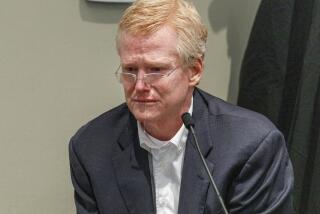Ruling Excerpts: ‘Just Not Tenable’
Excerpts from the transcript of U.S. District Judge Richard P. Matsch’s ruling Wednesday rejecting Timothy J. McVeigh’s request for a stay of execution in the Oklahoma City bombing case:
The prescribed punishment for Timothy McVeigh’s crimes includes death if 12 jurors believe it is justified under all the circumstances and exercise their moral judgment as the conscience of the community.
Whatever may in time [be] disclosed about possible involvement of others in this bombing, it will not change the fact that Timothy McVeigh was the instrument of death and destruction.
Generally speaking, only the most egregious misconduct, such as bribery of the judge or members of the jury or the fabrication of evidence by a party in which an attorney is implicated, will constitute a fraud on the court. Less egregious misconduct, such as nondisclosure to the court of facts allegedly pertinent to the matter before it, will not ordinarily rise to the level of fraud on the court.
And considering the evidence presented to the jury, there is no plausible argument that Timothy McVeigh is not guilty on any of these charges. The Tenth Circuit Court of Appeals on direct appeal recognized that and characterized the evidence as “compelling.”
The argument of defendant’s counsel that the jury may not have found the death penalty was justified if the defense had been able to implicate additional perpetrators is just not tenable.
The defendant . . . must have knowledge of this fact: whether others were involved with him. And if that be the case, he had the opportunity to present evidence within his own knowledge at a sentence hearing.
. . . there is a great deal of difference between an undisciplined organization or organization that is not adequately controlled or that can’t keep track of its information--those are not the questions here. We’re not here for the purpose of trying the FBI.
I’m not suggesting that the defense had all of the resources of the Government available; but they, in my view, certainly had adequate resources.
There seems in my review of what’s been submitted here no pattern of what was not disclosed that would suggest a scheme to keep away from the defense what they needed for trial, including the sentence hearing.
I’ve since this matter has arisen and in consideration of this petition and the materials provided reflected on this trial and the outcomes. I did not comment on that at the time of the sentencing of Timothy McVeigh. I could not do so.
But I can say now that for anyone who heard and saw the evidence presented at the trial of Timothy McVeigh, there can be no doubt that on April 19, 1995, around 9 in the morning, Timothy McVeigh parked a Ryder truck in front of the Alfred P. Murrah Building in Oklahoma City; that the truck was packed with explosives; that Timothy McVeigh ignited fuses attached to those explosives and walked away; that at 9:02 that morning, those explosives were detonated, killing 168 men, women, and children; maiming, disfiguring and seriously injuring many more people; the destruction of the building and the destruction of government services.
. . . Timothy McVeigh was the instrument of death and destruction.
More to Read
Sign up for Essential California
The most important California stories and recommendations in your inbox every morning.
You may occasionally receive promotional content from the Los Angeles Times.










